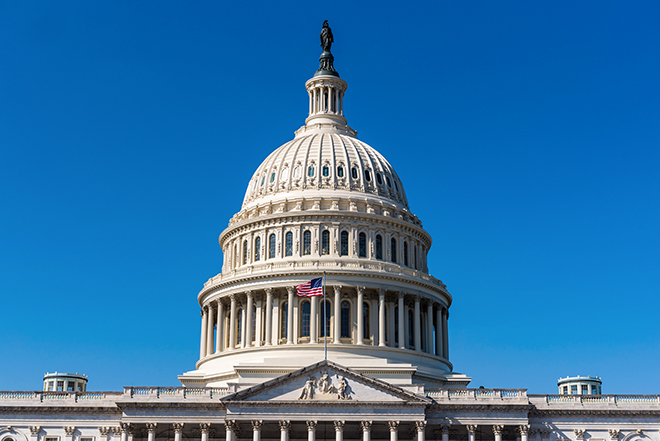Featured Topics
Featured Products
Events
S&P Global Offerings
Featured Topics
Featured Products
Events
S&P Global Offerings
Featured Topics
Featured Products
Events
S&P Global Offerings
Featured Topics
Featured Products
Events
Financial and Market intelligence
Fundamental & Alternative Datasets
Government & Defense
Professional Services
Banking & Capital Markets
Economy & Finance
Energy Transition & Sustainability
Technology & Innovation
Podcasts & Newsletters
Financial and Market intelligence
Fundamental & Alternative Datasets
Government & Defense
Professional Services
Banking & Capital Markets
Economy & Finance
Energy Transition & Sustainability
Technology & Innovation
Podcasts & Newsletters
15 May, 2025

| Lawmakers debated amendments in the federal budget reconciliation that centered on spectrum and AI. Source: Richard Sharrocks/Moment via Getty Images |
While spectrum and AI have previously been areas of bipartisan agreement, a recent markup session around these topics has split House Republicans and Democrats along party lines.
A marathon markup from the House Energy and Commerce Committee that stretched into the wee hours of May 14 saw lawmakers tackle the legislative component of a broader effort to deregulate and reallocate spectrum, as well as a legislative maneuver aimed at preventing states and localities from regulating AI.
On spectrum, Committee Chairman Brett Guthrie, a Kentucky Republican, said his proposed addition to the federal budget reconciliation bill would generate $88 billion through reauthorizing the Federal Communications Commission's spectrum auction authority and would provide $500 million to the Department of Commerce to modernize federal IT systems. The framework for spectrum modernization opens up 600 megahertz of spectrum for auction and complements the FCC's notice of proposed rulemaking, which would expand satellite services for operators such as Space Exploration Technologies Corp.'s Starlink and Amazon.com Inc.'s Project Kuiper.
"Both [spectrum and IT modernization] are crucial for maintaining and expanding U.S. technological leadership," Guthrie wrote in an op-ed in The Wall Street Journal.
CTIA President Ajit Pai, who served as FCC chair during the first Trump administration, urged Congress to pass the reconciliation bill with the committee's text included.
"This concrete pipeline, paired with clear deadlines, is critical to meeting consumer demand for mobile connectivity, promoting U.S. economic competitiveness, and protecting national security," Pai said.
While the proposal to open up spectrum and auction it for commercial use has bipartisan support, House Democrats, including ranking member Frank Pallone of New Jersey, said Republicans planned to misuse funds raised through spectrum auctions. Rather than funding President Donald Trump's proposed tax breaks, Democrats backed an amendment that would have allocated the funds for enhanced emergency response communication infrastructure programs such as Next Generation 9-1-1.
Republicans voted along party lines to block that amendment. Also blocked was an amendment that would have directed the spectrum auction funding toward rebooting the shuttered Affordable Connectivity Program, which provided a broadband discount for eligible households.
A fork in the road on AI regulation
AI regulation has been an area of rare consensus-building in an otherwise divided Congress. Members of the House Bipartisan AI Task Force and Senate AI Forum have identified vulnerabilities in US supply chains and found common ground on topics as wide-ranging as calls for increases in funding for research and development of advanced semiconductors to crafting more robust data privacy laws.
But with more than 1,000 laws proposed at the state level, Republicans cautioned that the patchwork approach would be detrimental to American innovators in the AI race with China and other global powers. Instead, they recommended that Congress provide clear rules of the road at the federal level in the form of Congressional preemption on AI legislation and a 10-year moratorium on state and local AI laws.
At the same markup session as the spectrum bill, Republicans defeated several Democrat-drafted amendments to the AI moratorium, including one from Pallone that would have removed the moratorium from the reconciliation text entirely.
Rep. Jay Obernolte, a California Republican who co-chairs the House AI Task Force, said the moratorium safeguards investments in AI and that Congress is "the appropriate regulatory body" to establish a framework for AI regulation.
"So much of this deployment of AI is obviously interstate commerce," Obernolte said. "If we don't do this, the people we are hurting the worst are the entrepreneurs."
Colorado Gov. Jared Polis, a Democrat, joined several Republican governors in voicing his support for the temporary pause on new state and local AI regulation.
Section C of the committee's budget reconciliation text contains comprehensive language prohibiting state or local laws on AI models or systems.
Democratic opposition
Some Democrats called the ban a "giant gift to Big Tech."
"This ban will allow AI companies to ignore consumer privacy protections, let deepfakes spread, and allow companies to profile and deceive consumers using AI," said Rep. Jan Schakowsky of Illinois. "After stopping comprehensive national privacy from passing last year, Republicans are going after states and leaving consumers unprotected online."
Others, like California Rep. Scott Peters, said he would support federal preemption for Congress on AI, but that a decade was too long to keep such a ban on state action in force.
Peters also advocated for bipartisan cooperation in energy permitting reform to provide certainty for both the industry and consumers and to remain open to diverse energy sources, rather than preferring natural gas — a particular need as demand for datacenters and advanced AI grows.
"Instead of making it easier to build everything, once again we are cutting off our feet in the race to energy resilience," Peters said. "This is the definition of picking winners and losers."